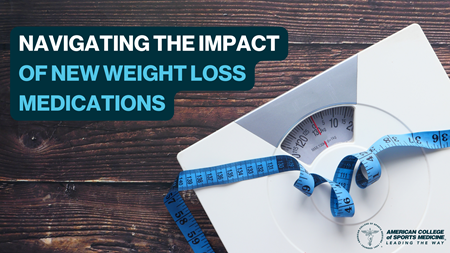Renee J. Rogers, Ph.D., FACSM |
Dec.
18, 2023

Ozempic™, Wegovy™, Mounjaro™, and now, Zepbound™ - everywhere you turn, you hear about these new medications that have changed the weight loss world and are making a major impact on chronic diseases. The reality is that while 2023 has been flooded with media and excitement, it will likely continue - these effective medications promote, on average, 15-20+ percent weight loss.
Now that these new medications are here, can we forget about diet and exercise when it comes to weight loss?
If you asked me 20 years ago if I would be talking to you about using medications as a strategy for weight loss – I would have said, “No.”
However, after working with thousands of people seeking to lose weight in both research and real-world settings, I now understand the complexity of obesity as a disease. Sometimes the path to weight loss using the traditional “eat less and exercise more” method is not enough, and additional support with medical management (like taking a medication) is needed.
I get how confusing this can be, especially with all the media attention these new medications are getting and all the mixed messages out there. To simplify, let’s breakdown some common misconceptions that I hear a lot. Spoiler alert: being physically active is still important!
#1 – Ozempic™ is the Magic Bullet for Weight Loss
Ozempic™ is approved for the treatment of type 2 diabetes, not weight loss. The two popular medications that are FDA (Food and Drug Administration) approved for weight loss are semaglutide (Wegovy™) and tirzepatide (Zepbound™). These medications were originally approved for type 2 diabetes and later approved for weight loss, which explains why there are different trade names.
So, are Wegovy™ and Zepbound™ the magic bullets for weight loss?
These medications are called nutrient-stimulated hormone therapies, and the name gives a clue to how they work in our bodies. Here is your quick and basic physiology lesson:
Nutrient-stimulated hormones signal our brain in ways that impact how much food we eat – this can be anything from how hungry you feel to whether or not you have food cravings. These new medications mimic those hormones in the body to reduce hunger levels and help people feel fuller longer. With that, people that respond to these medications, typically eat less which can lead to weight loss.
While these new weight loss medications are an effective tool, in general they are only impacting how much you eat, not how well. They also are not helping you move more. This is why these medications need to be a part of a broader plan that includes a physical activity and healthy eating strategy, and possible behavioral counseling to help you learn about underlying feelings and strategies to support weight loss.
Your healthcare provider is the best person to help you understand:
-
If, when, and which weight loss medication might be right for you;
-
The appropriate way it should be taken, whether you qualify; and,
-
The best comprehensive treatment approach that includes eating better and moving more.
#2 – Weight Loss = Willpower
Sure, eating healthier and exercising more takes some self-discipline. Unfortunately, life and real barriers can get in the way. In fact, there are many other factors that can impact your weight – everything from your genetics, to how you sleep, where you live, and other dynamics that may increase your drive to eat, such as emotions, hormones, or other medical treatments – to just name a few. All of this can make “eating less and moving more,” MORE difficult over time.
To blame weight loss failures on willpower is assuming everything mentioned above is under your control, which it’s not.
People taking weight loss medications report that they have better control over their hunger and no longer have intrusive thoughts related to food. That removes some of the willpower challenges (yay!).
But let’s get back to the healthy lifestyle strategy. Let’s face it, figuring out how to build a healthy lifestyle is not always easy, with or without a weight loss medication. This is where I encourage you to get support from a professional.
Rule No. 1 – if someone tells you they have “the perfect” weight loss method or program, do not engage! Whether you are seeking dietary or physical activity support, only work with professionals who spend time determining what is best FOR you, not just overlaying their method ON you. Seek out support from registered dietitians and certified exercise professionals with experience in weight management and behavior change strategies.
#3 You Can Use a Medication to Quickly Lose Weight and Skip Diet and Exercise
I hear this constantly in my work, and sadly it is promoted a lot by influencers and celebrities. It sounds like the perfect solution, especially if you have previously struggled to lose weight with diet and exercise alone. Unfortunately, talking about using the medications in this manner is not recommended for several reasons:
First, all these medications were tested and approved for use alongside a lifestyle program that includes healthy eating and physical activity. Using a medication without modifying diet and moving more is against what is recommended!
Secondly, once a person comes off the medication, those hunger signals will come back, and this can be followed by weight regain.
Third, any time you lose weight, you don’t just lose fat mass, but also lean mass. This is typical, but there is concern that higher levels of lean mass loss might be occurring with these newer weight loss medications.
A big question is whether the lean mass that is lost is actually your muscle mass.
Most people don’t realize this, but the terms “lean mass” and “muscle mass” are not the same. Muscle mass is only one aspect of your body’s lean mass. Researchers are currently studying the effect these medications have on lean mass loss that includes not only muscle but also bone, water, organs, and other body tissues.
Why does this matter to you? Some people taking these medications report feeling weaker and taking care of your muscular health may help.
This is where exercise may play an important role.
Will resistance training completely preserve lean mass or muscle mass loss? The verdict is still out, and the answer is likely no. But we do know that resistance training is still beneficial for you during weight loss, and of course can improve feelings of weakness, and your overall strength and physical function.
Some people taking these medications also report feeling fatigued or tired even though they have lost weight.
Overtime, participating in a regular exercise program can improve feelings of fatigue. Moderate-intensity physical activity, as simple as brisk walking, can be a great place to start to increase stamina.
Have I convinced you yet that these medications are not quick fix for weight loss?!?!
Bottom line – a foundation in healthy eating patterns and a physical activity plan are critically important to support your weight loss journey to have you feeling your very best! They may help you keep the weight off and provide health benefits beyond what happens on the scale.

Dr. Renee J. Rogers, Ph.D., FACSM, is a senior scientist at the University of Kansas Medical Center and also works as an independent healthy lifestyle consultant and strategist. She chairs ACSM’s Strategic Health Initiative on Behavioral Strategies and Summit Program Committees. Dr. Rogers is an expert in bio-behavioral intervention design with a focus on relevant engagement approaches that blends her 20+ years of experience working in exercise physiology, behavior change, and weight management.